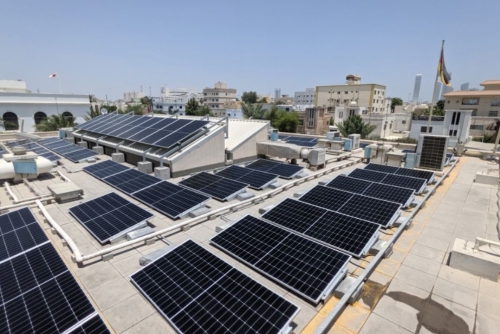The German Embassy in Manama recently made a significant stride towards Bahrain’s Net-Zero goal by installing a solar photovoltaic (PV) system on its roof. This initiative was announced at a ceremony attended by Dr. Mohamed bin Mubarak Bin Daina, Minister of Oil and Environment and Special Envoy for Climate Affairs. The newly installed solar PV system has a capacity of 34.8 kilowatts (kW) and is expected to generate around 54 megawatt-hours (MWh) of clean energy annually, resulting in an estimated annual saving of BD 1,566 on electricity bills for the embassy.
The ceremony, themed “Step by Step Towards Net-Zero, Contributing to Bahrain’s Climate Goal,” underscored the embassy’s dedication to sustainability. German Ambassador to Bahrain, Clemens Hach, expressed confidence in the viability of renewable energy, citing the project and the embassy’s recently acquired electric car charged by the solar panels as examples of the technology’s accessibility and financial feasibility. The Ambassador also highlighted the potential for widespread adoption of renewable energy in Bahrain to align with the national vision.
Yasser bin Ibrahim Humaidan, Minister of Electricity and Water Affairs, praised the German embassy’s initiative as a benchmark for others to follow, emphasizing Bahrain’s commitment to a sustainable future and increased reliance on renewable energy sources. Tarsheed Energy Consultation and Services, a Bahraini renewable energy solutions company, played a crucial role in facilitating the project and plans to expand the solar PV capacity by up to 40%, in line with the government’s target of generating 20% of energy from renewable sources by 2035.
The embassy’s vision includes an expansion of the solar PV system to the car park in phase two, with an additional 30 kW capacity to cover 35% of its overall annual energy consumption. This proactive approach towards increasing renewable energy adoption and reducing carbon emissions is crucial in combatting climate change, especially in a country like Bahrain where electricity production and transportation contribute significantly to CO2 emissions. The adoption of solar PV by the embassy represents a substantial step towards lowering its carbon footprint and aligns with Bahrain’s ambitious goals of achieving 5% and 20% renewable energy production by 2025 and 2035, respectively.
The German embassy’s initiative serves as a shining example of environmental responsibility, inspiring others to embrace renewable energy solutions and contribute towards a cleaner and more sustainable future for Bahrain. By installing solar panels and committing to expanding renewable energy capacity, the embassy is not only reducing its environmental impact but also advocating for a broader shift towards greener energy practices in the country. Through collaborative efforts and investments in renewable energy technologies, Bahrain can continue to make progress towards its climate goals and create a more sustainable future for its citizens.































